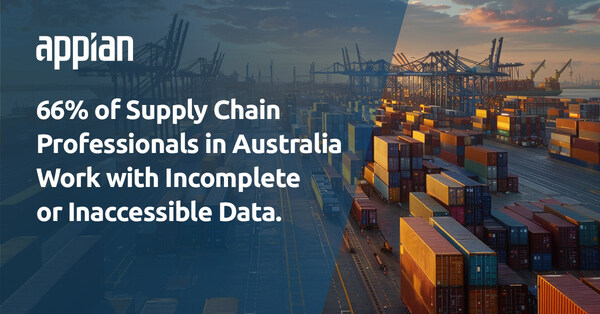Australian Supply Chains Plagued by Data Accessibility Problems, Appian Study Reveals
- Written by PR Newswire

|
66% of Supply Chain Professionals Work with Incomplete or Inaccessible Data
SYDNEY, Aug. 28, 2024 /PRNewswire/ -- New research from Appian (Nasdaq: APPN)[1] reveals that Australian supply chains are crippled by data accessibility issues, with 66% of surveyed supply chain employees stating that they find themselves working with incomplete, or inaccessible data in their roles.
 Australian Supply Chains Plagued by Data Accessibility Problems, Appian Study Reveals: 66% of Supply Chain Professionals Work with Incomplete or Inaccessible Data
Australian Supply Chains Plagued by Data Accessibility Problems, Appian Study Reveals: 66% of Supply Chain Professionals Work with Incomplete or Inaccessible Data
The study, which surveyed 300 supply chain workers across the shipping, distribution, and transportation sectors, highlights persistent data-related obstacles despite ongoing digital advancements in the industry. The lack of unified data significantly affects inbound visibility, creating challenges in predicting what, when, and how much inventory will arrive at distribution centres or factories.
The research found that for approximately 41% of supply chain professionals, the ability to maintain operational efficiency is compromised by poor data accessibility. Similarly, 31% of the workforce expressed difficulties completing essential inventory management tasks. This uncertainty around the availability of parts and materials hinders future operational capabilities, impacting production planning and decisions on adjusting output levels.
"Australian supply chains have a data problem. They rely on digital processes and accurate data to function yet are asking their workers to operate with incomplete or inadequate information to manage complex, often disconnected operations across critical areas such as logistics management, shipment tracking, and schedule coordination," said Luke Thomas, Area Vice President Asia Pacific and Japan at Appian.
"Fragmented, inconsistent or unavailable data creates a lack of real-time visibility that impacts key functions within the supply chain such as inbound visibility, which can have knock-on effects on efficient staffing and warehouse operations."
The Risk of Inaccessible Data
While major digital transformation projects are widespread in the supply chain[2] sector — 78% of respondents noted their organisations had adopted new digital initiatives within the last five years—data usability has not kept pace.
Today, 43% of workers identify data accessibility as their primary data challenge, 36% of respondents say that data security and protecting sensitive private data is their biggest concern and a significant portion indicated that data overload, where abundant data is available but there is no effective way to analyse and use it, is their largest problem.
"When information is inaccessible or unable to be analysed accurately, it complicates decision-making processes and heightens the risk of operational errors or ongoing inefficiencies across supply chain operations," Gordon Maddock, Regional Vice President, Broad Markets at Appian, explained. "Unclear data governance can also inadvertently provide access points for unauthorised users, posing a threat to both operational integrity and confidential information."
To address these challenges, Appian advocates for the strategic implementation of a modern process automation[3] platform enhanced by a data fabric.
"A data fabric[4] is an architectural layer and toolkit that seamlessly integrates data across disparate systems, whether its on-premises or in the cloud," Maddock said, "By creating a centralised, unified view, it substantially enhances both security and operational efficiency. This integration is crucial for supply chain operations, allowing for precise control over who can view, update, and delete data, and ensuring that every piece of information is accurately accounted for and securely managed, whilst enabling action to be taken on the data."
Data Challenges Impact Customer and Employee Experiences
Appian research also highlighted the impact of poor data accessibility on the overall customer and employee experience. It found that approximately 39% of workers encountered obstacles in meeting customer service expectations directly due to complications arising from inadequate data access.
Compounding the issue, 33% of those surveyed reported that such data-related challenges adversely affect the employee experience. This dissatisfaction is particularly problematic for Australian supply chain organisations facing skilled worker shortages, where maintaining a satisfied and efficient workforce is crucial to prevent increased turnover, knowledge loss and to ensure workforce stability.
Lacking unified and visible data needed to forecast productivity fluctuations render proactive staffing decisions impossible. This leads to inefficient labour management, with employers struggling to optimise both casual and full-time labour. Consequently, this impacts the overall experience of both staff and the service output for their customers.
AI: Low Adoption, High Potential
Despite the growing adoption of digital transformation strategies, the integration of Artificial Intelligence (AI) in supply chain operations[5] remains low, with only 3.67% of workers regularly using AI-powered systems. This slow uptake highlights key opportunities for enhancing supply chain efficiency and responsiveness through advanced technologies.
"Embracing AI and more sophisticated data management tools can revolutionise the way we approach supply chain operations. Connecting and streamlining access to data can transform challenges into opportunities, fostering a more responsive and resilient supply chain ecosystem," concluded Thomas.
Download the full Appian Asia Pacific Data Trends Whitepaper[6] to learn how industries like supply chain can build resilience by improving data access and automating process orchestration to improve visibility, agility, and profitability.
About Appian
Appian is a software company that automates business processes. The Appian AI Process Platform includes everything you need to design, automate, and optimise even the most complex processes, from start to finish. The world's most innovative organisations trust Appian to improve their workflows, unify data, and optimise operations—resulting in better growth and superior customer experiences. For more information, visit appian.com[7] [Nasdaq: APPN]
Follow Appian on LinkedIn[8] and X (formerly Twitter[9]).
Photo - https://mma.prnasia.com/media2/2490567/Appian_Australian_Supply_Chains.jpg?p=medium600Logo - https://mma.prnasia.com/media2/1488235/Appian_Caption_2700px_Logo.jpg?p=medium600[10][11]
References
- ^ Appian (Nasdaq: APPN) (c212.net)
- ^ supply chain (c212.net)
- ^ process automation (c212.net)
- ^ A data fabric (c212.net)
- ^ supply chain operations (c212.net)
- ^ Download the full Appian Asia Pacific Data Trends Whitepaper (c212.net)
- ^ appian.com (c212.net)
- ^ LinkedIn (c212.net)
- ^ X (formerly Twitter (c212.net)
- ^ https://mma.prnasia.com/media2/2490567/Appian_Australian_Supply_Chains.jpg?p=medium600 (c212.net)
- ^ https://mma.prnasia.com/media2/1488235/Appian_Caption_2700px_Logo.jpg?p=medium600 (c212.net)
Read more https://www.prnasia.com/story/archive/4492276_AE92276_0







